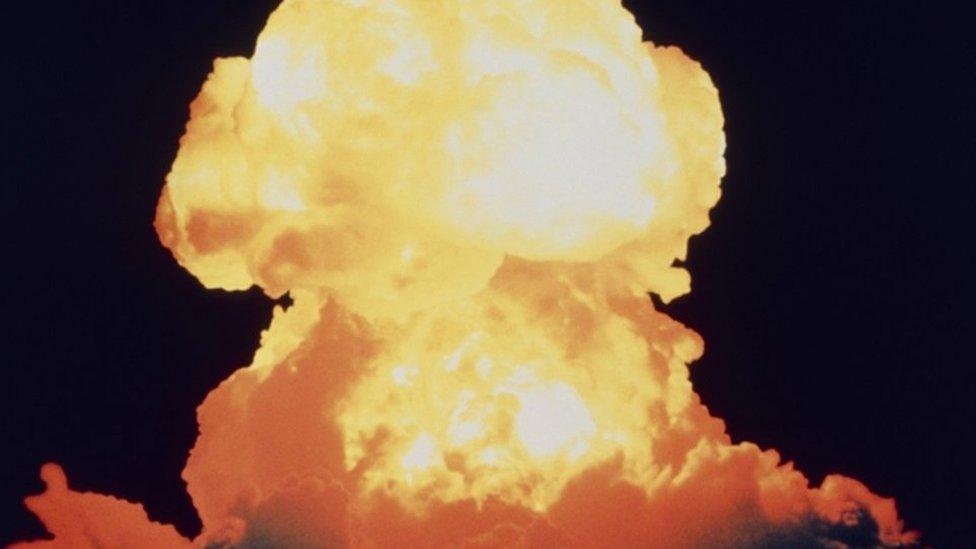Decoding Kim's speech and the Pacific threat
- Published
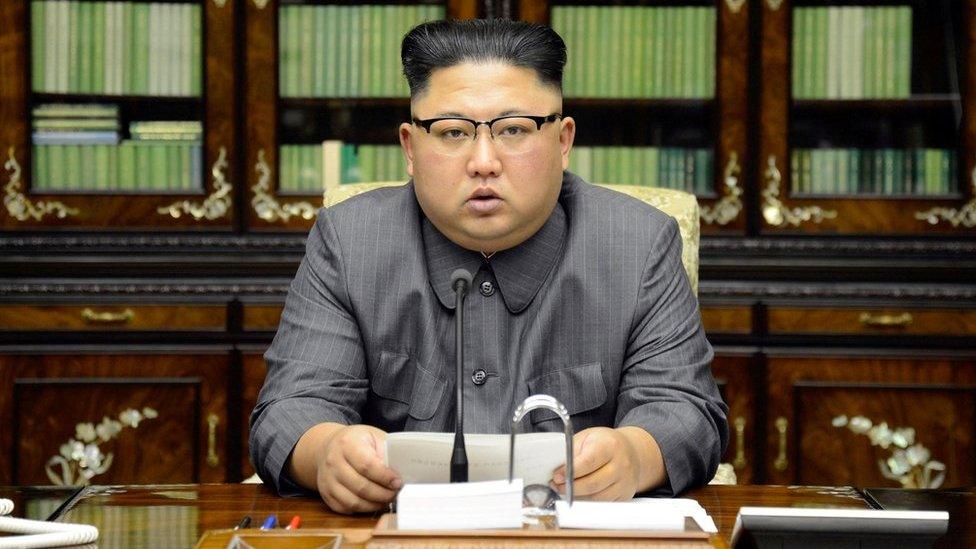
North Korean state media released this picture of Mr Kim delivering his statement
Pyongyang's foreign minister has said the North is considering a nuclear test around the Pacific, after a personal statement from North Korean leader Kim Jong-un to US President Donald Trump. Analyst Ankit Panda decodes this unprecedented statement - and what the Pacific threat could actually mean.
The threat follows another remarkable statement by the North, a first-person address from Mr Kim to Mr Trump.
Kim Jong-un's statement - the first of its kind - came shortly after the North Korean delegation led by Foreign Minister Ri Yong-ho arrived in New York for the annual United Nations General Assembly debate.
As such it merits a close reading and serious consideration.
Why did it come now?
The statement was manifestly a response to the US leader's braggadocio on Tuesday at the General Assembly, when he threatened to "totally destroy" North Korea if the United States was forced to defend itself or its allies.
It also marks what is perhaps the apotheosis of a slowly simmering war of words between the Trump administration and the North Korean regime.
In August, we watched as Kim Jong-un posed with a map threatening an enveloping ballistic missile strike on the US territory of Guam and Mr Trump promised "fire and fury" - possible nuclear first-use, in other words - to North Korea in exchange for continued threats.
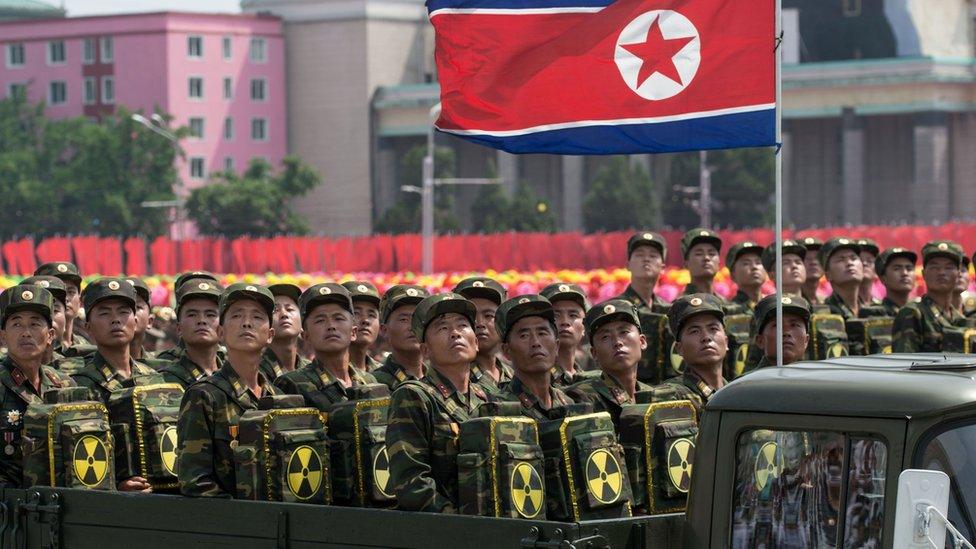
Pyongyang relentlessly pursues its nuclear ambitions
While North Korea's state media serve as a propaganda tool, more often than not the reclusive state's regime tells us exactly what it wants and exactly what it is planning to do in these statements.
Could it be about Donald Trump, personally?
First, even readers unaccustomed to North Korea's public messaging will note the wide range of ad hominem insults levied at Mr Trump in the statement.
Mr Kim lambasts the US leader - who'd dubbed him "Rocket Man" - as "mentally deranged," a "dotard" and a "frightened dog".
Second, notably, Kim Jong-un makes no reference to the US "hostile policy" in his statement.
The "hostile policy" is North Korea's paramount grievance about the US's East Asian alliances, permanently deployed military presence in South Korea and Japan, and provision of nuclear umbrella coverage to Seoul and Tokyo.
That Mr Kim chose to ignore it in a speech bemoaning the US president's threat to "destroy" his country appears notable in combination with his personalised critique of Mr Trump.
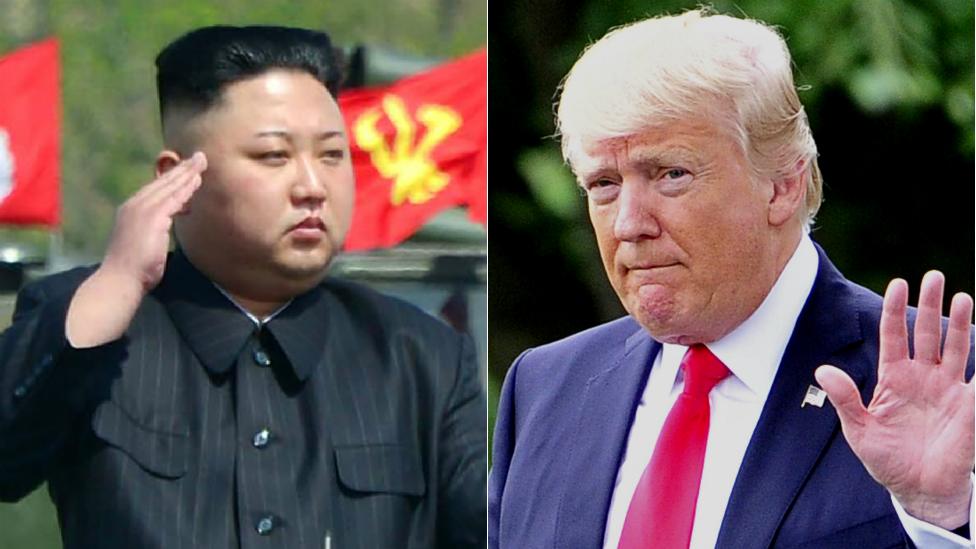
How much of the tension is personal rivalry?
The implication here is that Mr Kim may regard Mr Trump as a sui generis phenomenon - his threats count as an affront to North Korea's dignity, but do not carry the weight of US policy.
Just as Donald Trump implied Kim Jong-un was irrational on Tuesday by noting that he was on a "suicide mission", so does Mr Kim imply that Mr Trump, instead of making a mundane speech at the General Assembly, chose to deliver "unprecedented rude nonsense one has never heard from any of his predecessors".
Finally, it's noteworthy that despite the overall bellicosity of the statement, Kim Jong-un does not opt to threaten the American people or the country itself. If there's a bottom line here it's that now it's personal.
A pretext for a major provocation?
Doubling down, Mr Kim noted that Mr Trump's open expression of the "will to 'totally destroy' a sovereign state… makes even those with normal thinking faculty think about discretion and composure".
The implication here is clear - Kim Jong-un does not see Mr Trump as a man in possession of "normal thinking [faculties]".
What then does Mr Kim propose to do with a leader that he clearly regards as unstable and irrational? Clearly angered by the threat to "destroy" his country, Mr Kim promises to "tame the mentally deranged US dotard with fire".
This is not hard to interpret - Mr Kim is using this statement to provide a pretext for a spectacular provocation involving his ever more impressive ballistic missiles and his increasingly more powerful nuclear weapons.
These provocations could come in many forms. Kim Jong-un has already got his foot in the door in terms of overflying Japan with ballistic missile systems - he has done so twice in the past month.
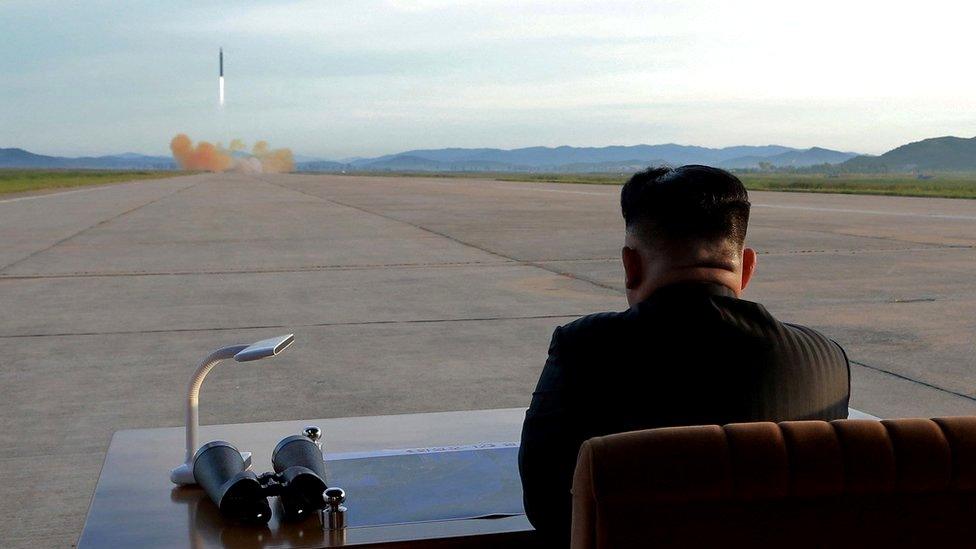
Kim Jong-un watched a recent missile test in person
He could endeavour to do so with North Korea's Hwasong-14 intercontinental-range ballistic missile.
Separately, he could test-fire a longer-range submarine-launched ballistic missile or salvo-launch intermediate-range ballistic missiles in the direction of the US territory of Guam.
Finally, North Korea hasn't carried out deliberate conventional attacks against the US or its allies since 2010, when it shelled a South Korean island and sunk a South Korean naval ship, killing more than 40 sailors. It could attempt to seize the initiative with new provocations of this kind.
The provocations do not stop there, however. Immediately after the release of Mr Kim's statement, North Korea's foreign minister told reporters that the "highest-level" action Kim Jong-un is considering is possibly the "strongest hydrogen bomb test in the Pacific".
What could the Pacific threat really mean?
This raises a terrifying spectre - one that North Korea watchers have mulled for some time, but which did not seem realistic until this year.
Kim Jong-un could conduct an atmospheric nuclear detonation in the Pacific Ocean.
There are two mechanisms for a test like this. One is for Kim Jong-un to mount the nuclear device he showed the world before his 3 September nuclear test and fire it over Japan, into the Pacific Ocean, and demonstrate a credible thermonuclear capability.
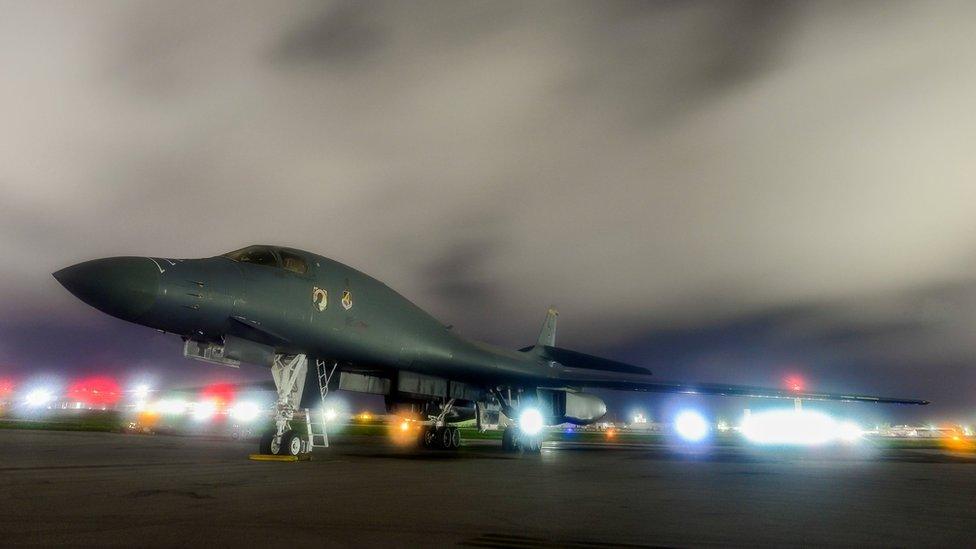
The Pacific island of Guam is home to the US Air Force's Andersen air base
Presumably, witnessing this feat would "tame" Trump into accepting the "equilibrium" that North Korea alluded to earlier this week - a state of stable nuclear deterrence.
Given the inadequacy of existing US and Japanese ballistic missile defence systems, it is far from a sure thing that such a test could be intercepted.
Jeffrey Lewis, an arms control expert at the Middlebury Center of International Studies at Monterey, alluded to China's fourth nuclear test, external as a reminder of why this logic may make sense to North Korea.
In the 1960s, US observers doubted Chinese nuclear capabilities until China placed a nuclear weapon on a ballistic missile and carried out an atmospheric detonation. Only then were they "tamed" to accept China as a serious nuclear state.
The last atmospheric nuclear test on Earth took place on 16 October 1980, by China.
What could the consequences be?
Nevertheless, the risks with a test like this are immense. Civil aviators and mariners in the target area may perish, given that North Korea does not offer international warning of its missile launch plans unlike other states that routinely test ballistic missiles.
Moreover, the environmental damage and fallout could be catastrophic. Should the missile fail over Japan - or prematurely detonate - the consequences would effectively guarantee a nuclear war in retaliation.
How could war with North Korea unfold?
North Korea could choose not to use a missile for a test like this to mitigate some risk, but still demonstrate an awe-inspiring capability.
A second mechanism could be to sail a ship out to sea with a nuclear device and detonate it. Here, the odds that US intelligence would detect and interdict the North Korean vessel are higher.
What's critical to recall here is that North Korea gives no assurances of any specific action. Mr Kim simply insults Mr Trump, defends the dignity of his country and promises to consider further action.
Similarly, the foreign minister's words hint at one possible outcome of many.
An atmospheric nuclear test from North Korea would represent the climax of its provocative testing behaviour. It could even spark a military conflict should Washington, Seoul, and Tokyo determine that no more could be tolerated.
Does the North recognise red lines?
Fortunately, North Korea has proven to be deliberate and incremental in its ballistic missile and nuclear testing and recognises the existence of "red lines" for the international community.
For instance, after its nuclear tests, it noted that no environmental damage occurred, a token gesture of "responsibility" despite its illegal and provocative behaviour.
Ultimately, Kim Jong-un likely saw this statement as an act of proportionality.
Donald Trump's "unprecedented" threat to his country at the United Nations merited a proportionate response - an unprecedented first-person statement from him.
And so the war of words continues between the leader of the world's foremost nuclear superpower and its newest nuclear state.
Ankit Panda is a North Korea expert and senior editor at The Diplomat, external.
- Published22 September 2017
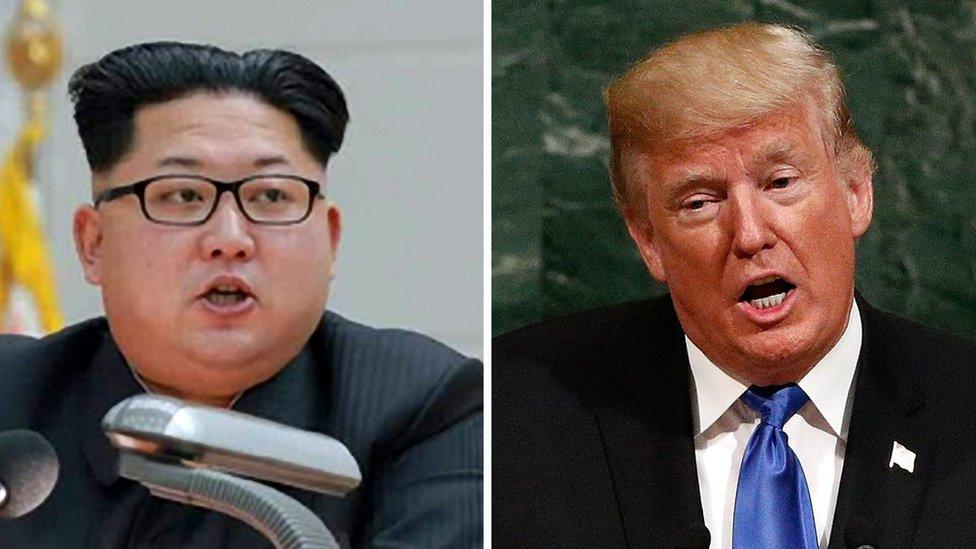
- Published19 September 2017
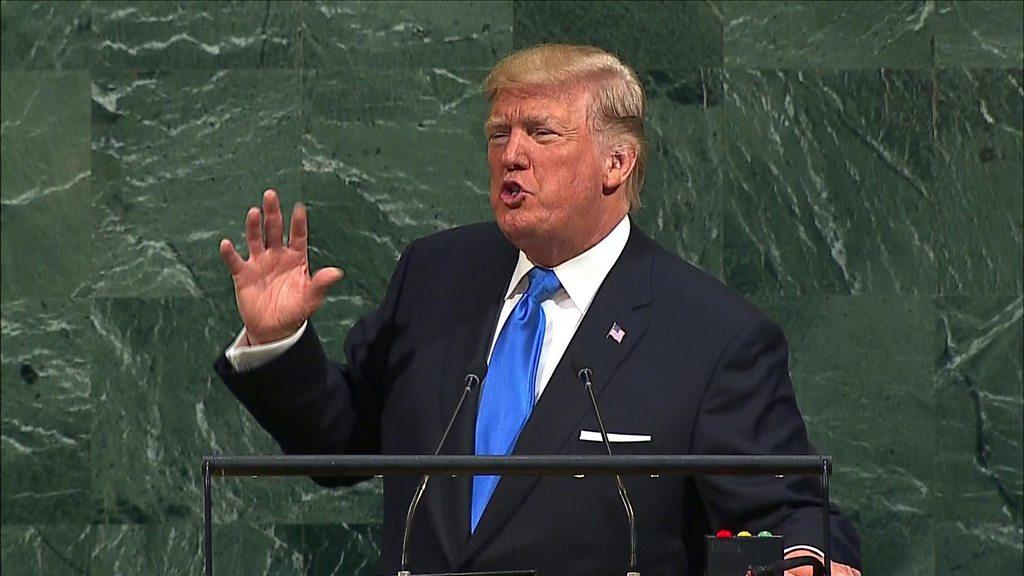
- Published3 September 2017
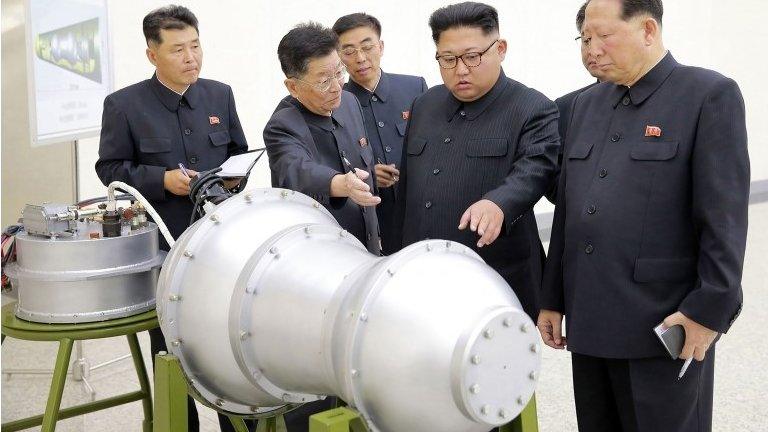
- Published3 September 2017
